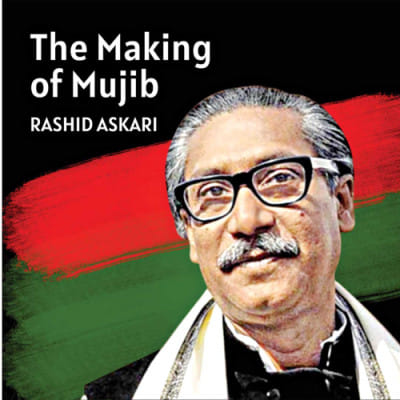An intellectual biography of Sheikh Mujibur Rahman

The Making of Mujib (Bangla Academy Dhaka, 2022) by Dr Rashid Askari is an intellectual biography of Bangabandhu Sheikh Mujibur Rahman aimed mainly at historiographers and socio-political scientists. Yet the linguistic intelligence of the book communicates with non-specialist audiences with equal eloquence.
Although quite a large number of biographies have been written about Mujib, none, says Dr Askari in the preface to his book, "evaluate his life and thought in the light of the political discourse concerning him". His book explores historico-political contexts in which Bangabandhu took solemn vows to stand against the Pakistani usurpers and address the interests and hopes of his people.
The writer attempts to develop the biography through the conceptual analysis of Mujib's motives and beliefs. As an intellectual historian, the writer offers insights into Mujib's life, the relationship between his life and political ideology, and his contribution to addressing the critical geo-political issues of the then-East Pakistan.
The diverse literature on Mujib has created many distinct images of this influential leader, which has led many researchers to attempt to unearth 'the real Mujib'. Rather than joining this quest to over-simplify Mujib's legacy, this biography explores a number of personae that Mujib assumed at different periods of his life. Dr Askari endeavours to unfold the sharp-minded, systematic thinker, and brilliant genius of Mujib's growth as a political giant in connection with his inseparable attachment with the socio-political and economic history of Bangladesh.
Three basic causes—decolonization, democratisation, and racial equality—were upheld by Mujib in his call for civil resistance, largely characterised by non-violence. Mujib used the phenomenon of non-violence against the Pakistani occupation to claim and establish autonomy in the region. His forms of actions included demonstrations, strikes, boycotts, and campaigns to reinstate peace and the constitutional order of the region. Askari reaffirms that in the formation of a political personality, Mujib nurtured his inborn passion and love for humanity.
A blending of enormous political insight and austerity made Mujib a sometimes difficult political figure. His strength was born in his morality and in his mysticism; he had to spend one fourth of his 54 years in jail. He was sent to jail 18 times and faced death twice. His firm conviction for justice and truth became the critical factor in motivating the oppressed people of the land. With his incantatory call to people in the historic speech of March 7, 1971, and his declaration of the Independence of Bangladesh, Mujib's people woke up to fight fire with fire, as Dr Askari records under the sections, "The Mighty Roar", "The Cruelest Crackdown", and "The Final Word".
The biography tells this story in eight chapters. They have small subsections to present facts, ideas, and views in small chunks. The text offers an accessible description of Mujib and his activities, along with analysis and commentaries of historiographers and news reporters on the Liberation War of Bangladesh. The use of intertextual instruments like translations, quotations, and allusions have helped the writer to examine his subject from multiple dimensions.
Dr Rashid Askari has been one of my heroes for his contribution to South Asian English fiction with his short story collection, Nineteen Seventy-One and Other Stories (Pathak Shamabesh, 2011). The book kept me up late, and continues to remind me of the transformative effects of a powerful narrative. Here, too, reading his work felt to me as though, as Nikolai Gumilev once put it, 'Only serpents shed their skins forever/ So that their souls would age and grow. / We are not serpents, all that clever/ We change not our bodies, but our souls'.
Meherun Nesa teaches English at Jagannath University, Bangladesh.

 For all latest news, follow The Daily Star's Google News channel.
For all latest news, follow The Daily Star's Google News channel. 



Comments